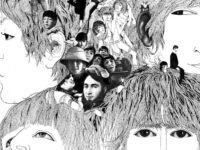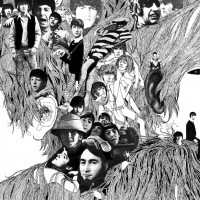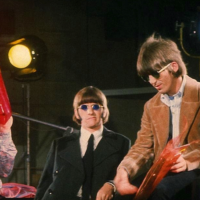Tampering with any aspect of the Beatles’ artistry is kind of like bringing a pointed stick to a machete duel: Regardless of the outcome, you know that sooner or later someone will get a case of the crazy eye and start swinging the big blade around to protect the platinum scarab that is the Beatles’ legacy.
After all, they were the greatest band of all time, and every part of their mythology is an important moment, etched in store as it were, and not open to interpretation.
Oddly enough, the Beatles’ U.S. record label Capitol didn’t see it that way, and so the truncated 1966 stateside release of Revolver contained 3 less songs than the original 14-song UK version. Keeping that in mind, one realizes there are a lot of different factors that can be taken into account when reconsidering what many consider the crown jewel of the Beatles’ recorded legacy.
And so, we present …
She Said She Said
Got to Get You into My Life
Taxman
I’m Only Sleeping** (not on original U.S. version)
Good Day Sunshine
I Want to Tell You
Paperback Writer* (A-side single)
Eleanor Rigby
And Your Bird Can Sing** (not on original U.S. version)
For No One
Rain* (B-side single)
Love to You
Here, There and Everywhere
Tomorrow Never Knows
First, consider the choices: As mentioned, there were 14 songs on the original UK Revolver album, but the single “Paperback Writer” and its B-side “Rain” were also recorded during these sessions — and as was the tradition at the time, the singles were considered to be aimed at a different market and usually not included on the vinyl LP. Taking those two songs into account, that makes 16 contenders for the albums 14 tracks.
So, before doing anything else, add “Paperback Writer” and “Rain,” and drop the two weakest tracks. “Dr. Robert” is nothing special; those people brought up on the U.S. Revolver won’t even know it’s missing. The other one is “Yellow Submarine.” Yes, it’s Ringo’s traditional vocal and it’s cute and funny, but go buy the Yellow Submarine soundtrack if you feel that strongly about it. We’re talking about Art with a capital “A” here, and there’s no room for doodles on the backs of napkins. (OK that’s a joke for those who are already sharpening their blades).
All that’s left to do now is track sequencing. “Taxman” is a great George Harrison piece, but as an opening track? Well, really — who wants to start off with a rock song about British tax laws? I think John Lennon’s “She Said She Said” is a much bolder opening salvo: if there’s nothing inevitable except death and taxes, let’s go with death — or death and drugs as is the case here.
Follow that with an up-tempo R&B sort of number as interpreted by popmeister Paul McCartney, and then insert Harrison’s beef with the revenue department. The next three tunes follow a similar pattern: namely, a Lennon (“I’m Only Sleeping”), a McCartney (“Good Day Sunshine”) and a Harrison (“I Want to Tell You”). Then finish side one with “Paperback Writer,” complete with trademark Beatles’ harmonies and some of the toughest sounding guitars you’d hope to find in 1966.
Now, remember that the first track of side two was traditionally reserved for the single. But “Paperback Writer” has already been used, so go with “Eleanor Rigby.” It’s another bold move, but it works well. And for those people who weren’t prepared for the Beatles plus strings, follow that with “And Your Bird Can Sing.”
After that? Well, the middle of side two is often strategically less important than other track positions on an album. It’s easy enough to find a home for these pieces that some other bands would have been overjoyed to write, but in Beatleworld, they’re just a few additional album tracks. After all, they can’t all be hit singles. “For No One,” “Rain,” “Love to You,” and “Here, There, and Everywhere” — these are all decent songs. “Rain” even has that experimental backwards tape loop, and “Love to You” is Harrison’s near perfect meld between pop music and East Indian instrumentation.
Finally, let’s not forget “Tomorrow Never Knows” which maintains its album closer status. This song sets up the Beatles’ future recordings by simply stating that musically speaking, the world would be theirs for the taking.
Additionally — go with the mono versions here. Somehow, the stereo versions of these songs distract from the fundamental fact that these are well written songs composed by inspired craftsmen who were in the right place at the right time. But more than anything, they realized that a reloaded revolver beats a machete, or even a pointed stick.
- How David Bowie’s ‘The Next Day’ Stripped Away All of the Artifice - March 15, 2023
- Why Deep Purple’s ‘Who Do We Think We Are?’ Deserves Another Listen - January 11, 2023
- In Defense of the Often-Overlooked Mott the Hoople - November 10, 2022




